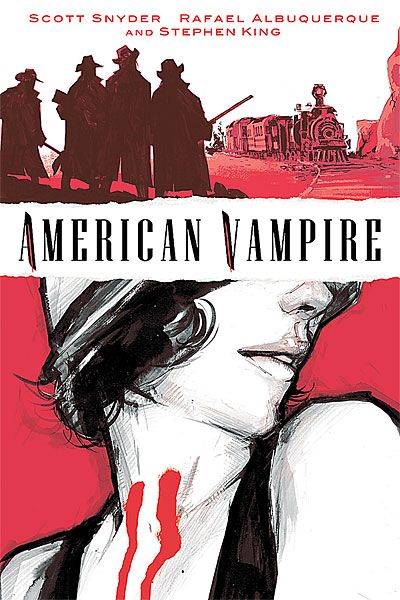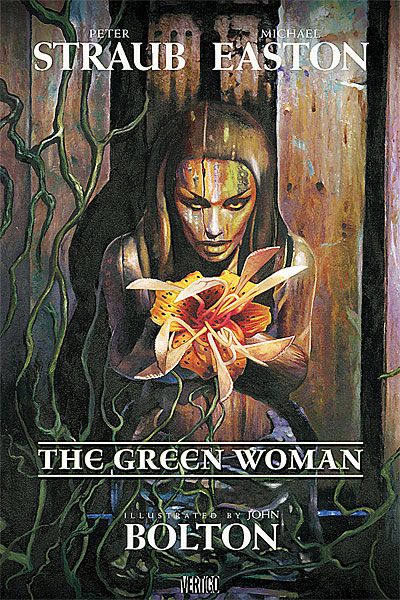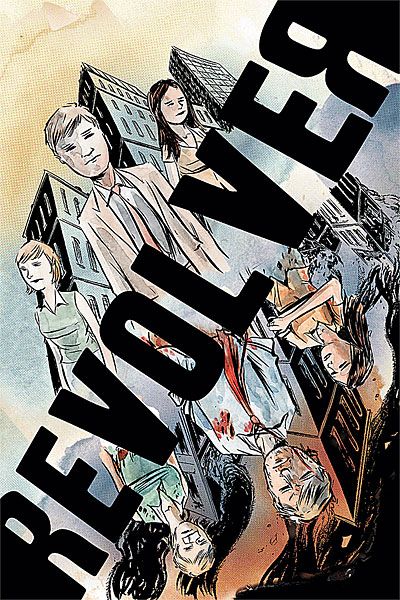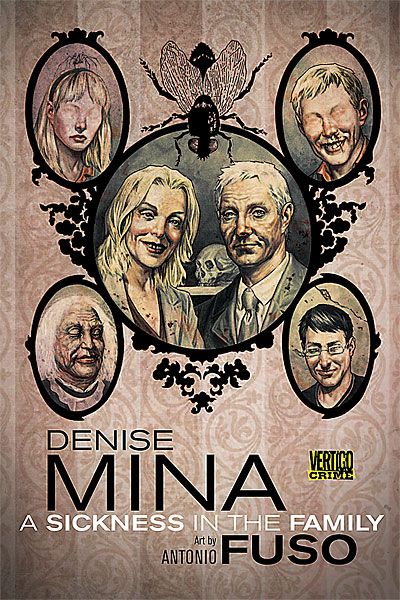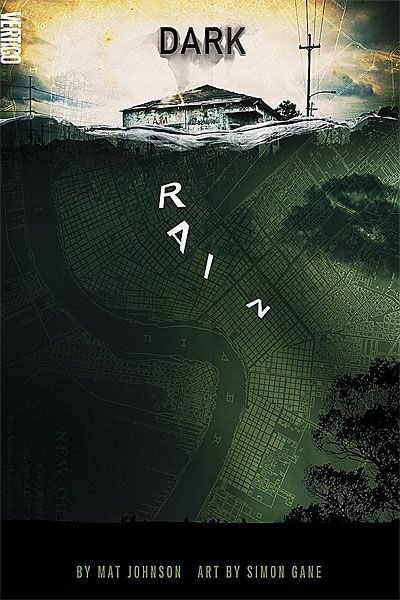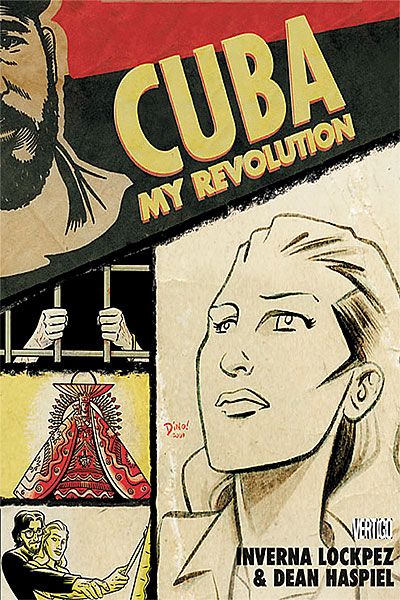When DC announced it was shuttering the Wildstorm and Zuda imprints back in September, after having announced the shutterings of the CMX line less than six months ago (and only two years since they canceled the failed Minx experiment), all eyes started moving uneasily towards Vertigo, the first and final imprint DC had left. It didn't help that DC had also announced they were going to be absorbing certain Vertigo characters like Swamp Thing back into the superhero fold. Add to that the recent cancellation of such series as Air, Unknown Soldier and Greek Street, and many ended up wondering not just if Vertigo was being sized up for the chopping block but when the ax would fall (I've got $20 in the office pool down for May 2011).
Mark Oliver Frisch aside, we don't have access to DC's actual, total sales numbers, however, so it's nigh-impossible to tell exactly how well Vertigo books are selling and how essential the line is to DC as a publishing and licensing entity. Perhaps the only way we can make any assumptions at all about the health of the line is to look at the comics that Vertigo has published in the past few months. Which is exactly what I plan on doing after the jump.
By Scott Snyder, Stephen King and Rafael Albuquerque
Vertigo, 192 pages, $24.99
If Vertigo is known for anything, it's as a publisher of fantasy/horror comics. There's some wiggle room there, of course, which I'll get to in a moment, but many longtime comics readers still associate the imprint with titles like Sandman, Preacher and Hellblazer (still going strong after all these years).
So it's not too surprising then that Vertigo would release something like American Vampire. Not only does the book offer a clever hook and supernatural twist that their books always seem to thrive on (in this case, American vampires are stronger and more rapacious than their European brethren and can handle sunlight), but it's got the added bonus of being co-written by a noted prose author. And not just any author mind you, but "master of horror" Stephen King himself! If ever the phrase "tailor made" seemed appropriate, it would be with the joining of this particular comic with this publisher.
Volume One, which collects the first five issues of the series, lays some pretty solid groundwork. While far from being frightening or even slightly unnerving, American Vampire remains a solid page-turner in the best Vertigo tradition. The main thrill here is watching protagonist and newbie vamp Pearl take out Clint Eastwood-style the old school, European bloodsuckers that have wronged her. Writer Snyder uses this classic revenge motif to good effect, turning Pearl into a sympathetic protagonist (who still kicks ass) and playing up the old world/new world analogies enough so they’re front and center, but aren’t rubbed in your face ad nauseum either. In fact, the King-penned sections focusing on the origin of the first American vampire, Skinner Sweet, and set in the Old West, aren't nearly as engrossing or entertaining. I don't know if Vampire can maintain that level of interest once it moves away from Pearl's thirst for revenge onto other characters and plot lines but certainly the potential is there for this to be one of the more solid Vertigo series of late.
by Peter Straub, Michael Easton and John Bolton
160 pages, $24.99
Of course, Vertigo has published just as many bad fantasy horror comics as it has good ones. Case in point is The Green Woman, a stand-alone graphic novel that is almost the mirror opposite of Vampire. It even has a well-known horror author attached to the project, in this case Peter Straub.
But where American Vampire plays it quick, clever and breezy, Green Woman is a dull, confusing slog. Moving back and forth in time, the book focuses on the cat and mouse games between a psychic cop and a uber-deadly serial killer. Lots of allusions to previous Straub books are dropped, which only serve to obfuscate unfamiliar readers all the more. Bolton's stiff, overly photo-referenced art doesn't help matters much either -- he's a consummate craftsman, but doesn't seem to understand sequential storytelling much at all. Several sequences are difficult to follow because of Bolton's choice of perspective or color and he does little to guide the reader in terms of setting and time. In many ways, Green Woman calls to mind not Vertigo's past successes as much as previous failures -- ponderous painted tomes like Shadows Fall and Faultlines. It doesn't make one fearful for the imprint's future as much as it does warily remind them of past missteps.
by Matt Kindt
Vertigo, 192 pages, $24.99
Lately Vertigo has been (wisely I think) attempting to extend its range by courting cartoonists from the indie and alt-comix side of town, most notably folks like Harvey Pekar and Jeff Lemire. Matt Kindt of Super Spy fame is the latest player to join the team, with his sci-fi-ish graphic novel Revolver. Again, the book rests on a clever (and -- dare I say it -- movie-ready) hook -- a seemingly average man inexplicably finds himself moving between two parallel universes. In one he's an average schlub with a dead-end job and materialistic girlfriend. In the other, he's literally fighting for his survival in a post-apocalyptic landscape.
I have a bit of a problem with one of the central themes of the book, which seems to be "we spend a lot of our time focusing on useless things and not enough on the stuff that matters." I don't need to be thrust into a doomsday scenario to know that and it cheapens the horror of the alternate world by having it exist solely as a macguffin to allow the main character to re-assess his values. To his credit, Kindt seems to understand that and attempts to subtly address it, especially in the finale, which suggests that learning what's important doesn't always result in a cheery ending or lack of bloodshed. Despite his best efforts, however, the book ultimately feels a bit too pat, both in its themes and its characterizations. I think for many the central conceit and Kindt's speedy, rough-hewn art will be enough of a draw, but I doubt the book will resonate for them beyond a rather superficial level.
by Denise Misa and Antonio Fusa
Vertigo, 192 pages, $19.99
Of course, Vertigo has been known to dabble in other genres beyond fantasy and horror. The success of 100 Bullets led the powers that be to start a line of crime/noir books, the rather obviously titled Vertigo Crime line (imprints within imprints!), A Sickness in the Family, being the latest example. I haven't exactly fallen in love with the Vertigo Crime books up till now, as they're so mired in genre that they seem unable to avoid even the hoariest cliches.
Sickness is rather enjoyable though. The book is basically Agatha Christie's And Then There Were None set amidst a dysfunctional family. So yes, there are few surprises plot-wise, but I liked how the characters’ various rivalries and tics, as broadly telegraphed as they were, played off each other over the central plot, especially in the case of youngest son Sam and his issues over being adopted. There are a number of plot holes and I'm not sure I buy the final denouement, as poetically apt as it may be, but the bottom line is Sickness manages to succeed as the slyly dark little page-turner it sets out to be.
The most striking thing about the book, however, was the awful lettering job by Clem Robins. Robins uses an unnatural, stiff, computerized sans serif font that (much like the recent Twilight adaptation) constantly called attention to itself and divorced me from the reading experience. Even if this wasn't their intention, what this sloppy decision said to me was "Vertigo doesn't care enough about this line to bother with getting decent lettering for their books." (I should note here that Robins does an excellent lettering job on many other Vertigo books, including the one listed at the bottom of this post, which, I think makes his choices here seem all the more peculiar and jarring.) As a result, even if Vertigo doesn't fall, I don't have high hopes for Vertigo Crime to make it to 2012.
by Mat Johnson and Simon Gane
Vertigo, 160 pages, $24.99.
Although not a part of Vertigo's crime line, Dark Rain also fits neatly into the genre, in this case the traditional heist format. It's about an odd-couple pair of ex-cons who try to rob a New Orleans bank during the Katrina floods only before a bunch of Blackwater-style mercenaries get there first. When I first heard of the book's plot, I groaned inwardly. Wasn't Katrina a horrific and dramatic enough story without the need to slap on such a tired plot device?
But Dark Rain proves to be a gripping and solid bit of entertainment. Johnson (whose previous work includes Incognegro, a book I didn't much care for) manages to avoid coming off like he's exploiting the tragedy for the sake of a quick read, mainly by filling his cast with relatable, diverse characters and harkening back to the seriousness of the real event without feeling like a cheap TV movie of the week. He also finds a near perfect collaborator in Gane, whose rubbery line allows for just enough exaggeration to imbue his characters with life but is realistic enough to make the reader feel like the story is, in fact, taking place in New Orleans and not Anytown, U.S.A. There are a million ways Dark Rain could have gone horribly wrong, and while it's far from perfect (the central villain is about as unsubtle as you can get) it manages to avoid enough pitfalls to be worthy of recommendation.
by Inverna Lockpez and Dean Haspiel
Vertigo, 144 pages, $24.99
But never mind crime, horror and fantasy! We know what kinds of comics really sell and get all the praise, at least among the comics cognoscenti -- memoirs! Just about every publisher that's not Marvel seems to have its eye on nabbing the next Persepolis or Fun Home these days. Hence, Cuba: My Revolution, Lockpez's story of how as a young Cuban woman she initially welcomed Fidel's new Marxist government, only to slowly awaken to the censorship, torture and injustice the new regime brings.
There's no question that Lockpez's story is harrowing. She suffers through a vast array of ugly, brutal experiences that would fell lesser folk on her quest for freedom. But the story falters under the weight of its ambitions. The supporting characters frequently talk in clumsy swaths of exposition and, except for the protagonist, never coalesce as characters. Haspiel does what he can, and his angular, dynamic art style serves the story well, particularly in a sequence where Lockpez is locked up and tortured. But the book feels cluttered, like it's in too much of a hurry to move to the next plot point, and there's never any room to rest on a particular moment or sequence. As a result, I felt a constant remove from Lockpez and her tale -- I was constantly aware that I was being told a story and rarely felt like I was immersed in one, if you can see the difference. Lockpez's story is important and worth telling, but it deserves a better rendition than what's provided here.
How to Understand Israel in 60 Days or Less
by Sarah Glidden
Vertigo, 208 pages, $24.95.
As almost a direct counterpoint to Cuba, Vertigo just released How to Understand Israel in 60 Days or Less, an involving, informative and surprisingly moving tale of the author's travels in the country during a “Birthright” tour.
Sympathetic to the Palestinian cause, Glidden portrays herself as an eternal skeptic (to put it mildly), constantly questioning what she’s being told and seen by her various tour guides and desperately trying to sift through the hype and propaganda to find some sort of truth about the country and its place in the world. What she discovers, of course, is that her pre-conceived notions are challenged time and again, and that the issues and people are much more complicated than first glance would suggest.
Strictly adhering to a nine-panel grid, and continually framing her subjects at a mid-level, Glidden provides a variety of viewpoints and voices without anyone coming off as a cardboard spokesperson for a particular point of view. Her graceful watercolor art seems overly minimal at first but manages to convey a wealth of detail and experiences the further into the book you delve. While Glidden may portray herself as confused and searching, Understand a smart, assured book that refuses to shy away from tough questions or simplistic viewpoints. It’s one of the best things Vertigo has published in years.
----
So what have we learned from this little tea-reading exercise? What do these books suggest about Vertigo’s position in the market? Is there any sort of vision or editorial guidance that ties them all together? Because if you can see a connecting thread here you're better at this industry analysis stuff than I am.
And I think that's really the central problem. Looking over these titles, the best I can come up with is Vertigo is attempting a "see if it sticks to the wall" approach, which doesn’t inspire a ton of confidence in their viability as a publisher. Of course, they've always attempted to expand beyond their genre comfort zone – remember, they published Peter Kuper's The System way back in the ‘90s – but regardless of quality, the above mish-mosh of genres, styles and stories doesn’t suggest any overarching editorial guidance or vision the way other publishers, be they Fantagraphics or Marvel, seem to have.
I suppose one uniting thread is the fact that, except for Vampire (and, I suppose, Israel, which Glidden originally published as a series of mini-comics), these are all designed as done-in-one graphic novels. That’s an understandable shift in format, as interest in pamphlet-style comic books that don't involve the Big Two’s superheroes appears to be withering away, but there's a double-edged sword here in that books serialized over time have a greater chance at generating conversation and interest. A book like Vampire, it seems to me, can build up buzz more consistently and slowly over time, and stand a better chance of generating new readers long after its initial release date, as Y The Last Man and Fables continue to do. A book like Dark Rain, on the other hand, could well be forgotten a month after it comes out.
That’s if they even get talked about at all. With all the different kinds of comics being published these days, both online and off, getting your book noticed above the din is tougher than ever, even for a company like DC. It doesn’t help that, except for Israel, few of these books rise into the truly inspired territory. The best of them enter a middlebrowish “good read” territory, which, while absolutely nothing to sniff at, isn’t necessarily enough to result in strong sales. There are an awful lot of “good reads” around these days, all clamoring for equal time.
As hard as it is to ascertain what sort of future Vertigo has in DC’s brave new world of comics publishing, I’m not feeling terribly encouraged by their current output to suggest they’re home free. Quality aside, the vast variety and style of these books suggest a bit of desperation, of searching about for a “sure, winning formula” more than it does a willingness to experiment. I hope I’m wrong. As down as I can get on it at times, I do think Vertigo has been a valuable imprint and can continue to be in the future. I’ll keep my fingers crossed.


